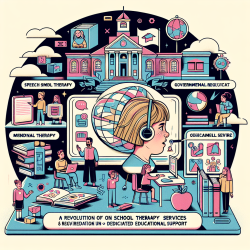Obsessive-Compulsive Disorder (OCD) significantly impacts the lives of children and adolescents, often leading to chronic symptoms and impairment in daily functioning. Traditional face-to-face Cognitive Behavioral Therapy (CBT) is the recommended treatment, but access to qualified therapists can be limited, especially in rural areas. A recent study, "Internet-based cognitive behavioral therapy in children and adolescents with obsessive-compulsive disorder: A randomized controlled trial," provides compelling evidence for the efficacy of internet-based CBT (iCBT) in addressing these barriers.
Key Findings from the Study
The study involved 60 children and adolescents aged 6–18 years diagnosed with OCD. Participants were randomly assigned to either an immediate treatment group or a waiting list control group. The treatment consisted of 14 therapist-delivered CBT sessions via videoconference over 16 weeks. The primary outcome measure was the Children's Yale-Brown Obsessive Compulsive Scale (CY-BOCS), with follow-up assessments conducted at 16 and 32 weeks post-treatment.
- Significant Symptom Reduction: The study found a significant decrease in OCD symptoms in the treatment group compared to the waiting list group. Cohen’s d between groups was 1.63.
- High Remission Rates: At the 32-week follow-up, 68% of the treatment group and 79% of the waiting list group (post-treatment) achieved remission.
- Patient Satisfaction: Satisfaction with the treatment was rated high to very high by participants and their parents.
Implications for Practitioners
For practitioners, these findings highlight the potential of iCBT to provide effective treatment for children and adolescents with OCD, particularly those in underserved areas. Here are some practical steps for implementing iCBT based on the study's outcomes:
- Adopt iCBT Platforms: Utilize secure, user-friendly videoconferencing platforms to deliver CBT sessions. Ensure that both therapists and patients are comfortable with the technology.
- Incorporate Family Involvement: Engage parents in the therapy process, providing them with the tools and knowledge to support their child's treatment at home.
- Monitor Progress: Use standardized measures like CY-BOCS to track symptom changes and adjust treatment plans accordingly.
- Ensure Follow-Up: Conduct follow-up assessments to monitor long-term treatment efficacy and address any recurrence of symptoms.
Encouraging Further Research
While this study provides robust evidence for the effectiveness of iCBT, further research is needed to explore its long-term impact and applicability across diverse populations. Practitioners are encouraged to contribute to this growing body of evidence by participating in or conducting their own studies.
To read the original research paper, please follow this link: Internet-based cognitive behavioral therapy in children and adolescents with obsessive-compulsive disorder: A randomized controlled trial.










